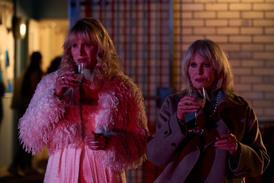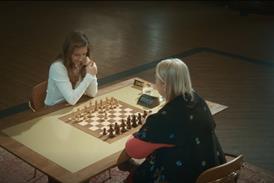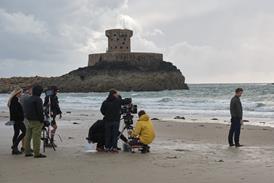“In the very overcrowded crime genre field this at least offers something different”

Patience, Channel 4
“Ella Maisy Purvis gives a fresh and convincing performance in Patience as a neurodiverse young woman working in a dry, lonely job in a police force’s ‘paper mountain’ archives who spots links between seemingly unconnected cases that others haven’t. Of course the ‘unlikely duo’ is nothing new for TV cop drama either, but in the very overcrowded crime genre field this at least offers something different.”
Carol Midgley, The Times
“In focusing specifically on Patience and her experience, the opening episode provides a nuanced portrayal of the autistic experience. After all, autism often goes undiagnosed in women due to outdated stereotypes. In other areas, Patience is less delicate. Black and white flashbacks to Patience’s childhood feel like an overdone storytelling tool, while the representation of Bea as a complacent mother putting work before her son feels equally predictable. But with Purvis’s performance underpinning the episode – and a genuinely surprising 11th hour twist – I’m intrigued to see what follows.”
Isobel Lewis, The i
“The murders are appropriately baroque for this sort of Euro-procedural, while Fraser and Purvis are always watchable, even if the premise begins to wear thin as the series evolves. York is cruelly mistreated, used as a tourist backdrop, with absolutely no sense of place or of its people. Sure, there is the odd establishing scene set outside the Minster, but really it could be Rotterdam or anywhere (indeed much of it was shot in Belgium). A worthwhile addition to the crime drama ranks, but one that fits into, rather than breaking the mould.”
Chris Bennion, The Telegraph
“It’s a neat premise for a crime show, but it’s not enough to have a quirky lone genius unravelling mysteries. Every Holmes needs a Watson, someone less brilliant but also less intimidating… someone more like us. Laura Fraser fills this role, as harassed DI Bea Metcalf, dedicated to her job but so disorganised she doesn’t always remember to pick her son up from school. The weakness of the opening episode was that it took too long to bring the two women together.”
Christopher Stevens, Daily Mail
“Preposterousness aside, Patience is, at best, a by-the-numbers piece of work. At worst, it’s embarrassingly clunky and ham-fisted, especially – and unexpectedly, given modern sensitivities to such portrayals – when it comes to Patience’s autism. All the boxes are ticked: she is great at pattern recognition! And puzzles! She doesn’t like to be touched and she listens to music through headphones all the time to cut out external stimuli! Look in vain for any nuance, any new insight into living with this condition.”
Lucy Mangan, The Guardian
Simon Schama’s Story of Us, BBC2
“Railing against the democratisation of debate – which is explicitly what Schama does when he calls social media ‘everybody stamping their feet’ – is, for an Oxbridge professor with a cosy BBC gig, perhaps not a good look. It turns the man who was such an admirer of Sillitoe and Boty into one of the reactionary forces we thought he was decrying. Schama is surely right about the importance of culture in our national story, but this programme is a minor contribution.”
Jack Seale, The Guardian
“The episode often felt less like a ‘story of us’ and more like a collection of separate stories and key cultural moments that didn’t necessarily form a narrative arc. At times things felt woolly. But Schama is a skilled storyteller, addressing his thoughts to a person off-camera rather than straight into the lens.”
Carol Midgley, The Times
“He might have been lightly skimming stones over the past 80 years, but Schama certainly asked a pertinent question – the subtitle of this first episode of three is Who Are We Now? We are a splintered nation ‘imprisoned in our little identity tribes’, says Schama, so where can we find our common national identity? The answer, presumably, must come in the next two episodes, as Schama scratched at history, highlighting moments of national introspection, without ever giving us a cogent thesis.”
Chris Bennion, The Telegraph

































No comments yet